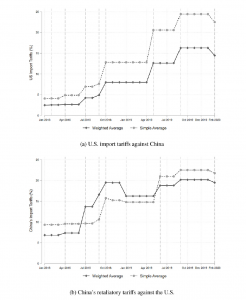The return of protectionism: The impact of the Sino-US trade war
GA, UNITED STATES, November 15, 2024 /EINPresswire.com/ -- This paper reviews the Sino-US trade war, analyzing its background, evolution, and economic consequences on both countries and the global economy. It also explores the reshaping of supply chains and the interplay between trade and industrial policies.
Despite significant welfare losses, the trade war has had little effect on employment and failed to address trade imbalances or bring manufacturing jobs back to the US, offering a new perspective on the complexity of international trade conflicts.
Since 2018, Sino-US economic and trade relations have become increasingly tense. Between 2018 and 2019, the US imposed seven rounds of tariffs on China, to which China responded with retaliatory measures.
The simple average tariff rates on US imports from China rose from 4.07% in January 2018 to 24.43% in December 2019, while the simple average tariff rates on Chinese imports from the US increased from 9.32% in January 2018 to 22.53% in December 2019 (see figure 1).
Consequently, the share of Chinese goods in US imports declined significantly — from a peak of 21.6% in 2017 to 14% in 2023. As the world's two largest economies, the trade conflict between the US and China is expected to have far-reaching implications not only for their trade and welfare, but also for the global economy.
In a recent review article (doi: https://doi.org/10.1016/j.ceqi.2024.09.003) published in the KeAi journal China Economic Quarterly International, two researchers in China reported an overview of the Sino-US trade war, analyzing its background, evolution and effects on the global economy.
“Existing literature indicates that the Sino-US trade war has resulted in significant welfare losses for both countries, with surprisingly little impact on employment,” says co-author Hong Ma from Tsinghua University. “Specifically, the additional tariffs imposed by the US on China have neither effectively addressed trade imbalances nor brought manufacturing jobs back onshore.”
The study also examined the reshaping of global supply chains resulting from the Sino-US trade conflict. “The ongoing trade tensions between China and the US have revealed vulnerabilities in the global supply chain and intensified the trend toward regionalized production networks,” shares co-author Jingxin Ning from University of International Business and Economics. “Interestingly, although China's share in US imports has fallen dramatically since the outbreak of the Sino-US trade war, in terms of value-added imports, the US' dependence on China's products has actually increased.”
The authors highlight that unilateral trade policies have limited effectiveness in addressing the complex economic and social challenges brought by globalization, and suggest future research focus on the interdisciplinary impacts of trade policies and developing a balanced strategy that promotes economic growth, distributive justice and political stability.
DOI
10.1016/j.ceqi.2024.09.003
Original Source URL
https://doi.org/10.1016/j.ceqi.2024.09.003
Funding information
Hong Ma thanks the financial support of the Social Science Foundation of China (Grant No.23&ZD046) and Tsinghua University Scientific Research Program (Grant No.2023TSG08102). Jingxin Ning thanks financial support from the Fundamental Research Funds for the Central Universities in UIBE (Grant No.23QD10).
Lucy Wang
BioDesign Research
email us here
Legal Disclaimer:
EIN Presswire provides this news content "as is" without warranty of any kind. We do not accept any responsibility or liability for the accuracy, content, images, videos, licenses, completeness, legality, or reliability of the information contained in this article. If you have any complaints or copyright issues related to this article, kindly contact the author above.

